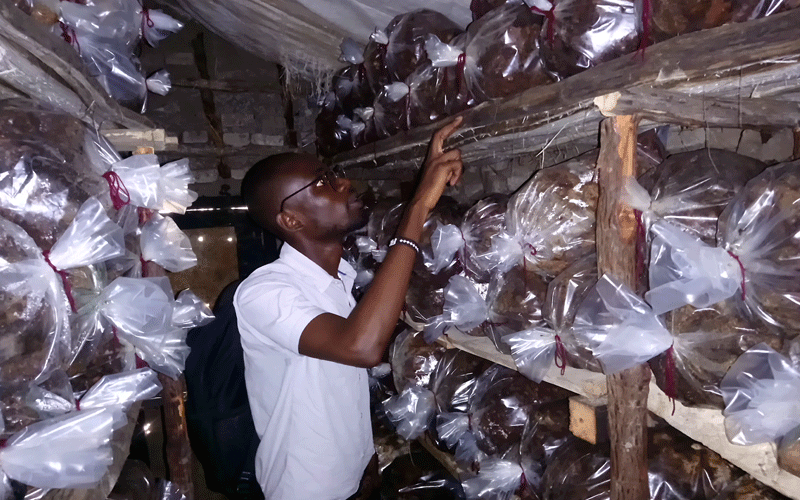How resilient youth engineered his way into mushroom farming

Reuben Mwambingu @reubenmwambingu
When friends and neighbours one morning spotted Alfred Kalama soaked in sweat as he scavenged through a thick mountain of garbage, they were concerned that he had lost his mind.
Kalama, 26, had just quit his job at a company where he had a brief stint as an electrical engineer.
Their fears were, however, wide off the mark, as they would later learn that Kalama had stumbled on a lucrative mushroom farming project.
They later learnt that the reason he was rummaging through garbage was because it was part of the mushroom planting process, which involves mixing huge volumes of maize cobs, wheat bran and sawdust among other materials.
Kalama, who holds a certificate in electrical engineering from Christian Industrial Training Centre in Mombasa, now runs Aldeda Mushroom Enterprise at his home near Mariakani town in Kilifi, where he is the chief executive. He says he makes a profit of up to Sh700,000 a month.
He is happy to be among the few young Kenyans, who have made an impact in the country and even created employment opportunities for himself and a friend Mercy Mwakera, 24, who is a marketing and financial management assistant.
“Through this project I can pay my bills and I have also gained interest in farming. I have since started venturing into the business even though farming has never been part of my ambitions,” says Mwakera who has established her own mushroom farm at her mother’s home in the neighbourhood.
Mwakera is among the youths mentored by Kalama on mushroom farming in the area.
And for the CEO, his mushroom farming project that had at some point started to set tongues wagging in the entire neighborhood is now the talk of town, as a positive contribution to society.
While he says it was a difficult decision to resign and chart his own path, Kalama says he does not regret his decision.
Save cash
“Before I joined this project, a certain company had employed me. With time, I realised the salary was not sustainable.
I started thinking of a unique sustainable job to do but somehow I realised that most of the jobs that came to my mind were not promising and that is how the idea of mushrooms came about,” he says.
Once he made up his mind, he embarked on a one-year research about mushroom farming, where he met farmers of varieties of mushroom species before enrolling for a seven-month course regarding the same.
He bumped into a renowned mushroom expert in Kakamega – Paul Kisiang’ani – who then mentored him and further sparked his passion for the venture.
“I was amazed by his love for mushroom farming. He grows all species of mushrooms from oyster, button, ganoderma, to shiitake.
I was trained for seven months and qualified and in 2016 I returned to Coast to apply the knowledge,” he said.
Under the tutelage of Kisiang’ani in Kakamega, the budding mushroom farmer acquired the crucial skills of technologically growing mushroom spawn- the genetic material used to grow mushrooms just like seeds are used by gardeners and farmers.
“I wanted to become independent by producing my own mushroom spawn. It is a technical process of propagated oyster mushroom spawn via grain spawn transfer, agar tissue culture transfer and liquid inoculation methods. We do this in a lab,” Kalama says.
“My first try had amazing returns and it motivated me to stay in the business,” he adds. He made a total of Sh1.6 million in three months.
Kalama says he had to first save cash until 2018 when he officially started the project in Mariakani.
“To successfully carry out this type of farming, you must have a mud thatched house, maize cobs, saw dust, agricultural lime.
Initially these items were difficult to find since for some things like maize cobs you can only get them after harvest season.
Finally I got all the materials and put up the structure and brought other people on board to assist in the project,” he recalls.
For species, Kalama says he decided to settle on oyster mushroom, which he describes as popular owing to high yield, fast growing besides carrying the benefit of lower cholesterol levels and a great source of potassium, iron and protein.
The ardent mushroom farmer recalls he began the project by planting 40kgs of mushroom spawns, which would produce two tonnes of mushrooms after one-and-a-half months.
Kalama begins the mushroom planting process by first measuring 100 litres of water in a tank. In every 20 litres of water he adds two cups of molasses, two cups of lime and quarter cup of Jik (bleach) and mixes the substrate.
He then adds three sacks of maize cobs to the mixture and lets it soak for 30 minutes to let the cobs submerge in the mixture.
In later stages the planting process begins by mixing the mushroom spawns and the substrate in jerry cans.
“These are carefully arranged in shelves inside a dark room which is now the mud house for one month…after a month the windows to the darkroom and the jerricans are opened then misting is done by sprinkling water on the floor of the mad house.”
Maintain humidity
The misting continues to maintain humidity inside the room and two weeks later, fresh mushrooms begin to sprout and are ready for harvesting. The process takes one-and-a-half months.
After harvesting, he says the produce is sorted and some of it is sold raw and the rest dried, blended with various types of flour before being sold.
“The dried ones have a shelf-life of about 45 days after harvest. We normally crush them, blend the flour with sorghum, cassava and pumpkin flour to end up with a nutritious product,” he says.
Half a kilogramme of mushroom powder goes for Sh500 while 1kg is Sh1,000. His clients include households and hotels.
But even with the good returns, mushroom growing has its fair share of challenges.
“The sweltering heat at the coast is not favourable for mushroom farming, thereby making misting a mandatory exercise,” he says.
He intends to expand the project to other counties to reach more youth.
“My ultimate goal is to form a sacco out of this project with a view to fighting poverty,” he says.









